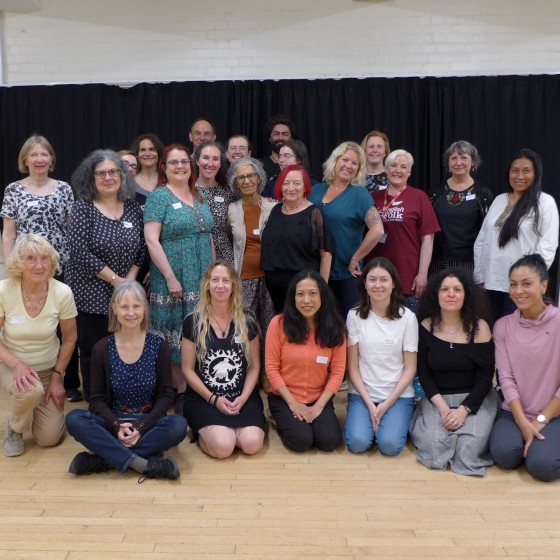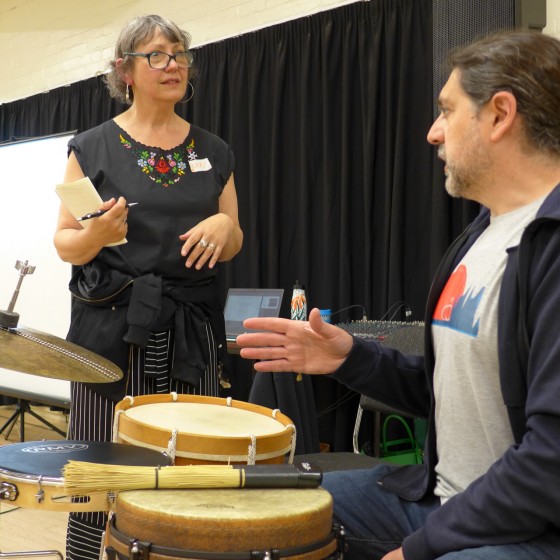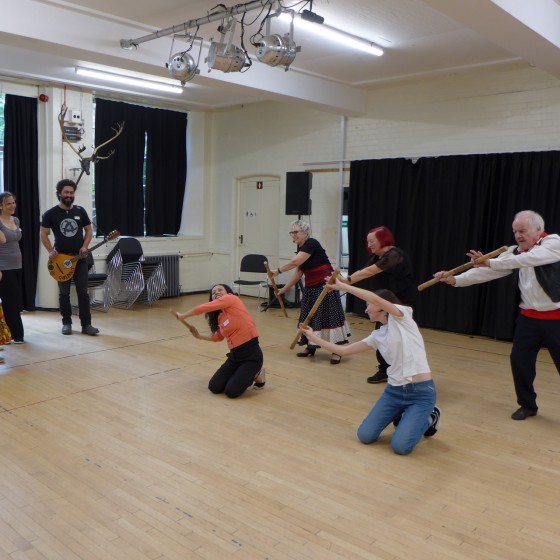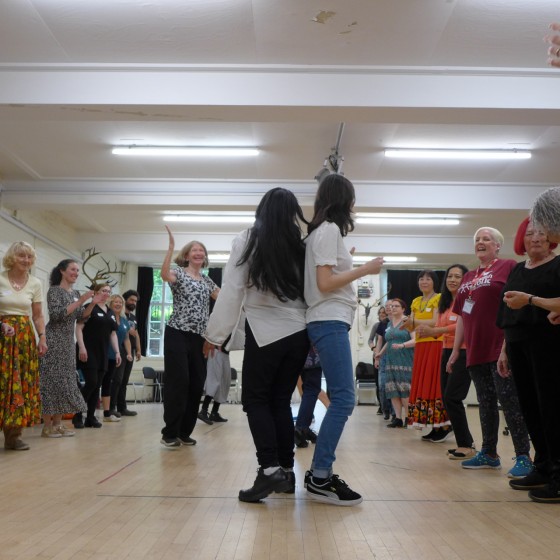Dancing Dialogues Events
The two primary research events have been recorded and are available to access. See below for content and order of documentation
1. Workshop and Sharing Day at Cecil Sharp House, London. 1st June 2024.Read more
Videos (Videographer: Roswitha Chesher)
- Introduction to project by researchers Libby Worth, Jerri Daboo and Rosemary Cisneros and project partners Jen Cox - EFDSS and Kelly Donaldson - Creative Lives. Warm-up with Liz Scholey.
- Dance groups intros, context video and step teaching.
- Short performances choreographed by small groups sharing their ideas and steps. They are supported by Andres Ticino percussionist.
- Final whole group dance - Kerry Fletcher leading with Andres Ticino on percussion.
- Kelly Donaldson responding to the day and opening final discussion.
Programme
Includes the day structure, research aims and list of contributors and the participating dance groups.




2. Online Discussion and Sharing. 17th February 2024.Read more
Recordings
Including introduction to the project and regional research by Libby, Jerri and Rosa, two talks from invited speakers, Q and A for both and response from Emma Meehan, chair of the Advisory Group.
Texts
- Emma’s response on the afternoon.
- Introduction and biographies for the speakers Iris de Brito and Jomhs Jaramillo with Sofie Narbed.
- Invitation to, and outline of, the online Discussion and Sharing event.
Workshop and Sharing Day
Saturday 1st June 2024, Cecil Sharp House, 2 Regent's Park Road, London NW1 7AY, 10.30 – 16.30
Welcome and Warm Up
Demonstrations and Sharing
Creative Working
Group Session
Round Up and Closing Comments
Participating Dance Groups (see our online map for details)
- Baila Peru – Peruvian Traditional and Creative Dances
- Rosaria Gracia – Brazilian Traditional Dance
- Hawaiian Hula – Hawaiian Traditional Dance
- Iberian Folk Dance and Music Society
- Karolinka - Polish Dance and Song Company
- Beltane Border Morris
- Aurora Appalachian – Appalachian Clog Dance
- Isambard’s Gasket Rats – Border Morris
- Shakespeare Morris – Mainly Bideford and Cotswold Morris
Guest Speaker: Kerry Fletcher on Folk Dance Remixed’s fusion of hip hop and folk dance.
The day takes place in Trefusis Hall, downstairs in CSH.
Programme
- 10.00 – 10.30
- Arrival coffee/tea and pastries.
- 10.30 – 10.50
- Introduction to the Dancing Dialogues research project and its development over the last six months. (Libby, Jerri and Rosa) Introduction to project partners: Jen Cox for English Folk Dance and Song Society (EFDSS) and Kelly Donaldson for Creative Lives.
- 10.50 – 11. 05
- Short physical warm-up for all. Led by Liz Scholey from Joint Morris Organisations – Equality, Diversity and Inclusion.
- 11.05 – 12.45
- Dance groups 6-minute sharing of one of their dances through a video clip (max. 2 mins) together with demonstrating a selected step from the dance shown. Coffee break included.
- 12.45 – 13.45
- Lunch – This will be in the smaller space called Storrow.
- 13.45 - 14.30
- Small groups sharing dances/steps and responding to prompts on the research questions.
- 14.30 – 15.30
- Whole group dance activity focusing on rhythm with percussionist Andres Ticino and arising from group sharing. To be led by Kerry Fletcher from Folk Dance Remixed.
- 15.30 – 15.45
- Tea Break
- 15.45 – 16.30
- Open activity/discussion commencing with a brief response to the day from Kelly Donaldson (Creative Lives). (Led by Rosa)
- 16.30 – 16.45
- Libby, Jerri and Rosa end with gathering ideas for future including community page on the website.
The day will be filmed for documentation by Roswitha Cheser. We will ask for your consent to be filmed when you arrive.
The details are all to be found on the website: Dancing Dialogues (dancing-dialogues.net).
This workshop day is planned as an informal and lively space for us all to explore the many dance forms brought to this event that are currently being practiced around the three regions we are considering (SW, SE, Midlands).
Our project partner, English Folk Dance and Song Society (EFDSS) have provided the project with the large space of Trefusis Hall with its great dance floor.
Through dance sharing and discussion, we aim to expand our understanding of traditional, national and folk dances of all cultural identities. Questions we would like to address include:
- How do traditional dance groups actively contribute to creativity and community?
- What does close attention to dance steps/patterns/rhythms reveal about the stories the dances tell?
- How have the significance of these dance activities been intensified as they came under threat during the recent COVID-19 pandemic?
Practicalities
Please retain the invitation. Any queries or special requirements, please contact your regional researcher.
- Jerri Daboo - South West, J.J.Daboo@EXETER.AC.UK
- Rosa Cisneros – Midlands, ab4928@coventry.ac.uk
- Libby Worth – South East, libby.worth@rhul.ac.uk
Dancers will be reimbursed for their travel to the event. Please organise this with your regional researcher.
Venue, travel details and access arrangements: Cecil Sharp House English Folk Dance and Song Society - Travel (efdss.org).
There will be a quiet space available for anyone who wishes to take time out during the day. Details on arrival.
Video clips and music. We will have a technician with us all day but to make the programme run smoothly please organise video clips you wish to show with your regional researcher. This will mean either pre-sending to your organiser or bringing with you on a USB. Music can be played direct from a smart phone.
Costume, instruments and Props
We do not expect dancers to come in costume or bring it. We will see the costumes on the videos. Please come with your usual practice clothes and shoes for dancing.
Recorded music is fine but if you wish to bring an instrument of course go ahead. If the steps you wish to show involve props please bring them. EFDSS has a good store of morris related props and clogs that we can also borrow if we need during the day.
Dancing Dialogues: an online sharing and discussion
Saturday 17th February, 2pm to 5.30pm, on Zoom
Introduction to the Dancing Dialogues Project: Libby, Jerri and Rosa
Presentation with Iris De Brito on African-Portuguese traditional dance
Iris de Brito Q and A
Presentation with Jomhs Jaramillo and Sofie Narbed on Renacer – Ecuadorian dance in London
Sofie and Jomhs Q and A
Respondent: Emma Meehan, Chair of Dancing Dialogues Advisory Group – summary and views of the afternoon
Dancing Dialogues symposium – summary by Emma Meehan
The Dancing Dialogues symposium opened with introductions from the network leads Libby Worth, Jerri Daboo and Rosa Cisneros. The network explores terminology such as folk, national and traditional dance in the UK, and how it connects with cultural identity. The key regions being explored are South East including London, South West including Devon and Cornwall and the East Midlands. The symposium aimed to bring groups with shared experiences together, connecting with and learning from each other. Some topics were raised about folk dance including hierarchies in the dance field in relation to funding and recognition, the challenges of terminology, such as whether it sits under the umbrella of amateur or professional, and how these dance forms might relate to ideas of ‘Englishness’.
International dance artist, Iris De Brito, kicked off the symposium with her reflections on dances of the African diaspora. She articulated how dances are passed on through the heart, linking us to ancestors, offering belonging and connecting to embodied identities. She raised concerns about engaging groups in the network who may wonder about researchers looking at them as ‘other’ – and reminded us that it takes time to build trust and explore the benefit to dance participants and communities. Finally, she wished to address the funding limitations for folk and national dances, and equitable payment conditions for dancers, dance forms and groups.
Next Sofie Narbed (lecturer at Royal Holloway) was in conversation with Jomhs Jaramillo (founder of the Renacer dance group). Jomhs has dedicated himself to sharing Ecuadorian dance in the UK. His aims were to share his heritage, and to bring his traditions alive in the UK. Colourful costumes, hair design and masks of regional characters were shown, along with videos of street performances with palpable audience excitement and engagement. He talked about tradition and evolution, with inventiveness to adapt his work in the UK. He articulated a pride in sharing this unique dance identity in the UK: ‘we are what we are where we are’.
Apart from these keynote speakers, several other dance group leaders from different national and folk dances shared their work. Rosaria discussed Brazilian and African diaspora dances, with groups meeting online, in the UK and in Brazil. She emphasized the importance not only of learning dances but stories, symbols and cultural context. Additional facets of the dances which she referred to included the impact on health and wellbeing, as well as connection with the spiritual or divine in the dances.
Jerri Daboo was in conversation with Mariya from the Bulgarian dance group, which explores village-specific signature dances. She mentioned how groups are taught through Bulgarian language because participants generally come from that community. Videos displayed the circular arrangement, skills of the steps, rhythm, vocalization, and attunement between participants. The pair also discussed the links with other Balkan regional dances.
Jerry presented about his Morris dance team, noting that there are 800 teams across the UK. He again raised the issues around recognition and funding. Self-funding through entertainment gigs is one avenue, where revenue for street performances are now limited due to people using card rather than cash. In his dance team, they explore tradition and innovation through creating their own dances – at least 1 new dance each year. He also questioned how Morris needs to reflect on who joins in – recruiting participants so they feel they belong rather than asking ‘is that me?’.
Jolanta spoke about her Polish dance group Karolinka, following the history of refugees post World War II and new more recent waves of immigration. She identified that religion and community are facets of the dance group, as a way to connect with cultural tradition and identity. Their group is also supported by a Polish dance federation which hosts a festival for Polish dancers outside of Poland to return there and perform. However, there are financial challenges and recruitment issues post-pandemic.
Asa Singh’s work with Banghra Dance London was shown through a video with participation at large outdoor festivals with audience participation. It featured young participants in the group transformed into teachers, passing on their legacy to others. The video also showed a celebration of culture – connection to roots and sharing it with others.
Speakers
Presentation with Iris De Brito on African-Portuguese traditional dance followed by Q and A.
"How can I talk about African-Portuguese traditional dances and its contribution to the contemporary dance sector when, amongst the vastly underfunded African-Caribbean forms, there's a lack of nuance?... How do the contributions of artists that appear "transient" in the mapping landscape of dance in the UK make it into the archive?... Perhaps one needs to understand the broad definition of "folk" dance and reflect on the importance of recognizing that culture moves constantly through underground networks that influences and impacts the sector. This is a vision that appears blurred by dance hierarchies..."

Iris De Brito: Iris is a multi-faceted dance artist who specializes in movement from the African diaspora. She has worked in professional dance theatre companies, TV and festival touring. Highlights include dancing at Evita - the film with Madonna, producing El Barrio - The Musical; receiving One Dance UK fellowships, writing a documentary, being creative artistic director and programmer of BATUKE! International festival in the UK, in receipt of Arts council funding. Iris has taught in the educational sector in London for over 10 years. Currently, Iris divides her time between Lisbon and London with different partnerships and projects including being project manager for Batoto Yetu PT, Workshop facilitator at NOVA University executive program and recently awarded funding to train in Senegal at the famous Ecole Des Sables. Iris is currently working towards a tour of her dance theatre piece “3 Cores Negras” which she’s developing through artistic development programmes.
Presentation with Jomhs Jaramillo and Sofie Narbed on Renacer – Ecuadorian dance in London followed by Q and A.
Jomhs and Sofie first met twelve years ago as part of Sofie’s MA research into Ecuadorian dance in London. Over a summer spent rehearsing and performing at community events, wrestling with suitcases of wollen ponchos and furry zamarros, and sharing Ecuadorian feasts, Sofie learnt of the passion and dedication it takes to create groups like Renacer and the great importance of dance practice for sustaining communities and identities. In conversation today, they will explore Jomhs' experiences of making and disseminating Ecuadorian dance in the UK, thinking about the role of material culture, of family and community connection, and about dance as a practice of both continuity and evolution.
Jomhs Jaramillo: Born in Quito, Ecuador, I came to live in London in 1997 at the age of 27. In my home country I was always a great enthusiast of Ecuadorian culture and, from the age of 15, becoming a folk dancer allowed me to explore and express that passion. In 2010 I started a dance group called "Renacer" (meaning ‘to be reborn’) here in London. Since then we have performed at many different venues within and outside the capital, and are proud to contribute to Ecuadorian and Latin American communities here with our dance.
Sofie Narbed: Sofie is a lecturer in Human Geography at Royal Holloway, University of London. Her research explores dance as a practice of relationality and world-making, particularly as it relates to feminist and decolonial politics in Latin America. She is currently working on an ethnographic monograph about contemporary dance worlds in Quito, Ecuador. She is also training as a somatic movement educator with the School of Body-Mind Centering.
Event Invitation
You are warmly invited to attend and participate in this free online sharing and discussion event as part of the AHRC-funded network project ‘Dancing Dialogues’. The project aims to research traditional, folk, and national dance groups of all cultural identities, to facilitate discussion and sharing between dancers and academics. We are working directly with groups in three regions of England, the South East, Midlands, and South West, though for this online event we welcome participants from any part of the country, or internationally.
The event will have talks and provocations from two keynote speakers, Jomhs Jaramillo, Director of the Renacer Ecuadorian folk dance group, in conversation with Sofie Narbed, Royal Holloway; and Iris De Brito, International Dance artist and creative artistic director and programmer of BATUKE! International festival in the UK. They will focus on our research questions, listed below. Participants will have opportunities for response.
This will be followed by practitioners or dance groups showing 5 minutes of video of their dancing focusing on a specific aspect of training for or learning the dance. The event is aimed at both dancers and academics to share and discuss the place that practising traditional, national, and ‘folk’ dances play in our lives.
Our three research questions are:
- What role do distinct traditional and national dances play for groups and communities in negotiating embodied identity in England today?
- How are notions of regional location, site, and geography central to extending our understanding of dance as contextual to the idea of ‘Englishness’?
- How have groups adapted, created, and survived during and post the pandemic?
We will be addressing these and other questions during the event. For more information on the project, please see our website: Dancing Dialogues (dancing-dialogues.net)
We particularly welcome contributions from dancers and artists. If you would like to share 5 minutes of your work including video (or this could be an entirely pre-recorded video), please email us at dancingdialogues@rhul.ac.uk.
There are other ways you can participate in the project, including placing your group on an interactive map, and filling in a questionnaire. Please see the website for more details.
Registration is free, but you must register to receive the Zoom link. Please use the following link: https://drama.exeter.ac.uk/whatson/index.php#2483
We look forward to your participation in the event.
Project team members: Dr Libby Worth, Professor Jerri Daboo, Dr Rosa Cisneros.